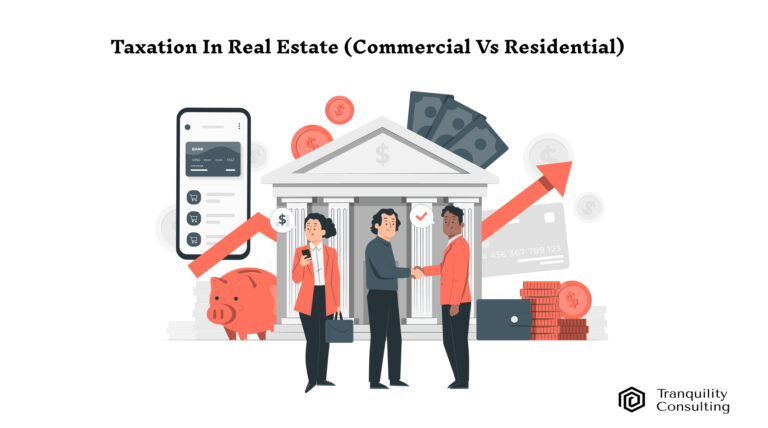Real estate is one of the most significant investments you can make, and whether it’s commercial or residential property, understanding the tax implications is crucial. In the U.S., taxation in real estate offers a variety of opportunities to maximize returns and reduce liabilities, but it also presents challenges that require careful planning. The tax landscape for real estate can be complex yet rewarding, from depreciation to mortgage interest deductions. This blog will explore the critical aspects of commercial and residential real estate taxation, providing insights to help you optimize your investment strategy and take full advantage of the tax benefits available.
Commercial Real Estate Taxation:
Commercial real estate involves properties used for business purposes, such as office buildings, retail spaces, warehouses, and industrial facilities. The taxation of commercial properties is distinct from residential properties and comes with its own set of rules and opportunities.
- Depreciation Deductions: One significant advantage of investing in commercial real estate is the ability to claim depreciation deductions. The IRS allows property owners to depreciate the cost of the building over a specified period, typically 39 years for commercial properties. This deduction can significantly reduce taxable income, making commercial real estate a tax-efficient investment.
- 1031 Exchanges: Another tax advantage available to commercial real estate investors is the 1031 exchange. This provision allows investors to defer capital gains taxes by reinvesting the proceeds from a property sale into a similar property. Leveraging a 1031 exchange allows investors to continue growing their portfolios without the immediate tax burden.
- Interest Deductions: Mortgage interest on loans taken to acquire commercial property is typically deductible. This deduction can further reduce the taxable income, providing substantial tax savings for investors.
- Property Taxes: Property taxes on commercial real estate can vary significantly based on location. It’s crucial to understand local property tax rates and how they impact the overall profitability of the investment. Some jurisdictions may offer incentives or abatements to encourage commercial development, potentially reducing the tax burden.
Residential Real Estate Taxation:
Residential real estate, which includes single-family homes, condominiums, and multi-family properties, also offers several tax benefits. Understanding the tax implications is vital whether you own a primary residence, a second home, or a rental property.
- Mortgage Interest Deduction: Homeowners can deduct the interest paid on mortgage loans for their primary residence and, in some cases, a second home. This mortgage interest deduction is one of the most significant tax benefits for homeowners, reducing taxable income and making homeownership more affordable.
- Capital Gains Exclusion: When selling a primary residence, homeowners may be eligible for the capital gains exclusion. The IRS allows up to $250,000 of capital gains to be excluded from taxation for single filers and up to $500,000 for married couples filing jointly. This exclusion can substantially benefit when selling a home at a profit.
- Property Tax Deduction: Property taxes paid on a primary residence and specific other real estate can be deducted from taxable income. However, the Tax Cuts and Jobs Act (TCJA) imposed a cap on the deduction for state and local taxes, including property taxes, currently set at $10,000.
- Depreciation on Rental Properties: The IRS allows the depreciation of rental properties over 27.5 years for those who own them. This depreciation deduction can offset rental income, reducing landlords’ overall tax liability.
- Rental Income and Expenses: Rental income is subject to taxation, but landlords can deduct various property-related expenses, such as repairs, maintenance, insurance, and management fees. Proper documentation of these expenses is crucial for maximizing deductions and minimizing tax liabilities.
Challenges in Real Estate Taxation:
While real estate offers many tax benefits, it also has challenges. Tax laws are complex and subject to change, impacting commercial and residential property owners. Staying informed and working with a knowledgeable tax professional is essential for navigating these complexities.
- Property Valuation and Assessments: Property tax assessments are often based on the property’s assessed value, which may only sometimes reflect its market value. Disputing assessments can be lengthy, but it’s worth considering if the assessed value is significantly higher than the actual market value.
- Tax Planning for Investors: Tax planning is critical for real estate investors. Strategies like depreciation recapture and cost segregation can offer tax advantages, but they also come with risks and potential tax liabilities. Careful planning and consultation with a tax advisor can help mitigate these risks.
- Impact of Tax Reforms: Changes in tax laws, such as the TCJA, can profoundly impact real estate taxation. Property must stay informed about potential reforms and how they might affect their tax situation.
Conclusion:
Both commercial and residential real estate offer significant opportunities for tax savings, but navigating the complexities of real estate taxation requires expertise. Understanding the tax implications of your real estate investments and working with a knowledgeable tax professional can maximize your returns and minimize your tax liabilities. Whether you’re a seasoned investor or a first-time homeowner, staying informed about the latest tax laws and how they affect your real estate holdings is crucial. With the right guidance, you can take full advantage of the tax benefits associated with real estate and achieve your financial goals.
FAQs
- What are the tax benefits of investing in commercial real estate?
- Commercial real estate offers tax benefits like depreciation deductions, 1031 exchanges, and mortgage interest deductions, which can reduce taxable income.
- How does the mortgage interest deduction work for residential properties?
- Homeowners can deduct the interest paid on mortgage loans for their primary residence and sometimes a second home, reducing taxable income.
- What is a 1031 exchange, and how can it benefit real estate investors?
- A 1031 exchange allows investors to defer capital gains taxes by reinvesting proceeds from a property sale into a similar property, enabling tax-efficient growth.
- What challenges should real estate investors be aware of regarding taxation?
- Investors should consider property valuation, tax law changes, and tax planning complexities, such as recapture depreciation, to avoid potential liabilities.
- How can Tranquility Consulting help with real estate taxation?
- Tranquility Consulting provides expert guidance in navigating real estate taxation, ensuring you maximize tax benefits and minimize liabilities through personalized tax planning services.
If you have any questions or need business-related tax consulting advice, please contact us at: [email protected]





